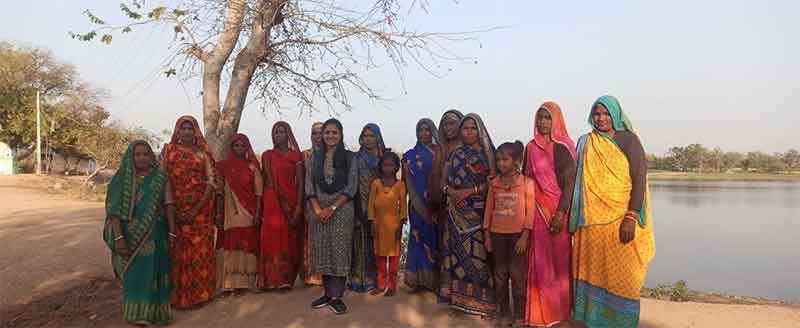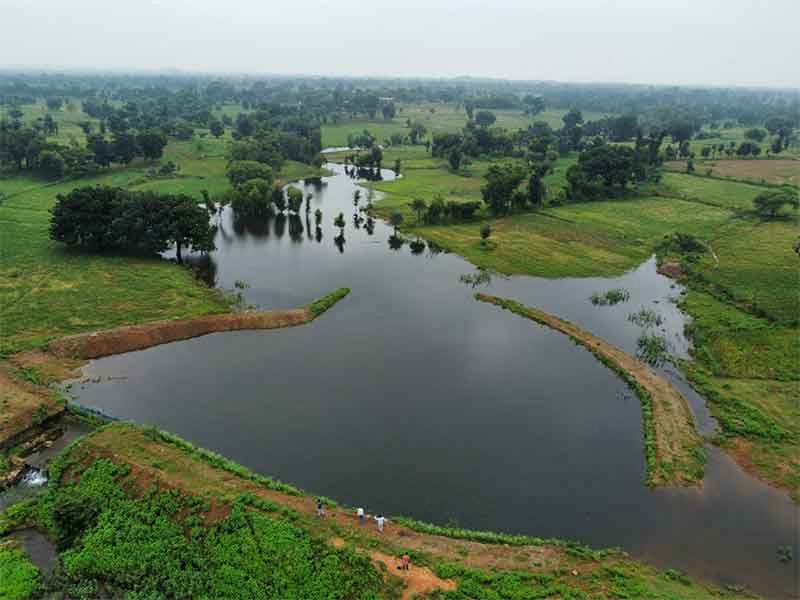
There are two problems which hold back rural women from making their full contributions to development. Firstly, their important role, potential and capabilities are often not recognized properly. Secondly, even when women appear to be apparently getting encouragement for a wider role in development, the overall paradigm may not be such that it will enthuse them as being the most suitable for them, and in their perception may even have some adverse impacts. In such a situation women cannot be expected to become enthusiastic and creative participants and contributors.
However when such wider conditions are created as appear to be very beneficial and suitable for them, and in addition they are also encouraged to come forward for a wider role, then it is a very happy experience to see the many beautiful and creative ways in which these women contribute, and how enthusiastic they are about this. I felt this happiness time and again in recent times when I had opportunities to meet such women and their groups in three states of India—Rajasthan, Uttar Pradesh and Madhya Pradesh. These efforts have been initiated by a voluntary organization SRIJAN which took a conscious decision some years back, while working with broad-based rural communities, to concentrate more on working with women from poorer and economically weaker sections. Women have more than lived up to this trust in their abilities by responding in highly creative ways, sometimes surpassing the expectations of team leaders.
In Neemkhera village of Niwari district (Madhya Pradesh) I met several of these change-making women who had collected for a group meeting close to a beautiful water tank constructed several hundred years back. They took turns to relate their story of recent years in which water conservation, natural farming, multi-layer vegetable gardens and kitchen gardens have been promoted to bring new hope to this remote village. The women mobilized in groups have played an important role in taking this forward. The result can be seen in the form of improved net income, reduced costs, much improved nutrition and improved sustainability in terms of water and soil conservation.
In Jagdharpura village of Karauli district (Rajasthan), located closer to Chambal ravines, the situation is a worrying one due to high level of soil and land erosion caused by rainwater on sloping land leading to risk of ravine formation. In these difficult conditions the intervention by SRIJAN brought new hope in the form of land levelling and bund making, water conservation and promotion of natural farming. With greater emphasis in recent times on strengthening mobilization of women, the achievements are increasing, as women keenly related in a group discussion.
In Bali block of Pali district (Rajasthan) women’s self-help groups are particularly strong and with banking linkages are able to give members credit support for small-scale entrepreneurship as well. Social issues and problems are also widely discussed in group meetings of women. These discussions led some years back to a powerful movement against liquor, resulting in significant reduction of liquor menace, a success achieved with great courage which the women have been working to stabilize since then.

To advance social progress, some women are also using this support for increasing educational opportunities in the new generation. One senior member Kamli Bai said that she has used this support to provide college education not just for her daughter but also for two daughters-in-law. A younger, educated member Kheema said that she used this support to arrange the college education of her husband so that he now has a higher income job as a teacher. At the same time several of these women are also members of a producer group Ghoomar which processes forest produce collected by tribal community members to enable them to earn higher incomes.
Such social entrepreneurship efforts are coming forward to ensure local processing of healthy, naturally grown agricultural and horticultural produce as well in districts like Tikamgarh (Madhya Pradesh) and Pratapgarh ( Rajasthan). In Pratapgarh this will be based on an enterprise called Dolmashree aimed at processing of guava and other fruits procured from newly grown orchards of Garasia tribal community women members. So several women natural farmers are also proud members and shareholders of enterprises based on their work as natural farmers. Saroj Kushwaha has emerged as a key person promoting natural farming in her village Pathari (Tikamgarh district). She manages a natural farming center which not only produces natural, non-chemical fertilizers and pest repellants for her own farm but also for many other farmers in this village who find it difficult to produce these on their own but can purchase these at a modest price from Saroj.
Under SRIJAN’s initiative in this village, Saroj was among the first to take up natural farming. In addition she worked enthusiastically for preparing a multi-layer vegetable garden which enabled her to diversify her produce significantly within the space constraints of her small farm of about 4 acres or so.
Saroj is only one of several hundred women in Tikamgarh district who have made important gains with natural farming in recent years with the help and guidance of SRIJAN, reducing farming expenses while producing more diverse produce of better quality. As Guddi Ahirwar, a dalit farmer who has been working keenly on a small but very productive farm says, “ Apart from reducing farming costs, the food we produce with natural farming keeps our families healthy and we save a lot also by not having to go repeatedly to doctors .” This has also opened up opportunities of improving income further by taking their more healthy produce to those consumers who value healthy food and are willing to pay at least a little extra for this. However to realize this objective they first had to take important steps towards acquiring capacity for food processing, and here too they had to be careful about processing methods which provide healthy food.
Kamlesh Kurmi, who has been involved in these efforts from the beginning says, “We realized the benefits of small-scale local processing compared to big processing in urban areas. When we extract oil from mustard or groundnut crops locally, then it is possible to make available the residual oilcake for local dairy animals and this is very beneficial for the local rural economy.”
Treading carefully this effort led to the formation of a farmer producer organization of women farmers. Subsequently this has been registered as a company which has 2300 women farmers as shareholders. Fittingly this company which evolved out of grassroots efforts to strengthen livelihoods has been named after the two important rivers of Bundelkhand region. It is called Ken-Betwa Women Farmer Producer Company.
The products offered by this company initially include healthy cold press mustard and groundnut oil, desi ghee based on milk of local breeds of cows, selected and graded groundnuts as well as arhar and moong pulses.
In addition to marketing these products, the company is also helping a sister organization by marketing the kodon and kutki millets, known for many health benefits, procured from this organization.
While there is a lot of enthusiasm for such efforts, some hard marketing realities including domination of bigger companies have to be reckoned with. This is all the more reason for consumers and others to extend more support to such pioneering ventures of rural women. If these efforts succeed then this can open the doors for several other somewhat similar ventures. SRIJAN’s efforts of promoting natural farming have already spread to a wide area growing a rich diversity of agricultural and horticultural produce and these can be taken forward by several such food processing enterprises that are closely linked to and in fact based on rural women working very creatively in ecologically protective agriculture and horticulture.
Subscribe to Our Newsletter
Get the latest CounterCurrents updates delivered straight to your inbox.
Bharat Dogra is Honorary Convener, Campaign to Save Earth Now. His recent books include Saving Earth for Children, Man over Machine, A Day in 2071 and India’s Quest for Sustainable Farming and Healthy Food.














































